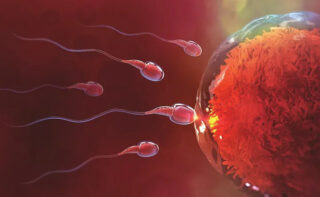
Montgomery Fertility Center
3202 Tower Oaks Boulevard
Suite #370
Rockville, MD 20852
301-946-6962

More Infertility Articles
The Mighty Egg

The human egg (aka oocyte) is the largest cell in the human body. It has the largest cytoplasmic content yet only half the DNA of a regular (somatic) cell. It is about 100 microns or 0.1mm, roughly the diameter of a hair strand. For comparison the human red blood cell is 6-8 microns. Compared to the human sperm, the egg is 10 times larger. Have you ever wondered why the egg has to be so large?
The human egg is derived from approximately 1,000 precursor cells found in the hind gut of the human embryo.
These initial cells develop into the primary egg cell that are rapidly multiplied to 6-7 million egg cells by the time the embryo is five months old. The fascinating part about the human egg is that the vast majority of eggs die before a child is born.
Have you ever wondered why the egg has to be so large?
It is the grandmother of all cells. It is like an acorn that yields the mighty oak tree! It acquires it gigantic size during its stage of quiescence after a child is born and before puberty.
During this stage it builds up and acquires all the necessary ingredients as well as a store house of mitochondria aka the nuclear power house that provides the burst of energy necessary for cell division.
The genetic content of the human egg is responsible for directing the path of development after the egg has been fertilized by the human sperm. This fertilized egg has to undergo a process of rapid cell division within the space of only a few days. The energy required for this process is enormous. This process is fueled by the store house of energy accumulated in the egg.
As a matter of fact, the entire orchestra of events that occurs before the human zygote’s own DNA can take over the process of division, is regulated by the RNA contained in the human egg.
Originally published on Medium.com
Other Articles You May Find of Interest...
- Why More Intended Parents Choose a Professional Surrogacy Agency for Surrogacy in Ukraine
- Tracking Cervical Mucus: Your Guide to Understanding Fertility
- Unlocking the Secrets of Your Ovulation Test Results for Better Fertility Awareness
- Start Your Fertility Journey with Confidence — Explore Bird&Be Today
- Timing Ovulation: How Egg White Cervical Mucus Can Help You Predict Your Fertility
- Does Implantation Bleeding Have Clots and When Should You Test?
- Can Ovulation Pain Influence Your Chances of Pregnancy Success?














